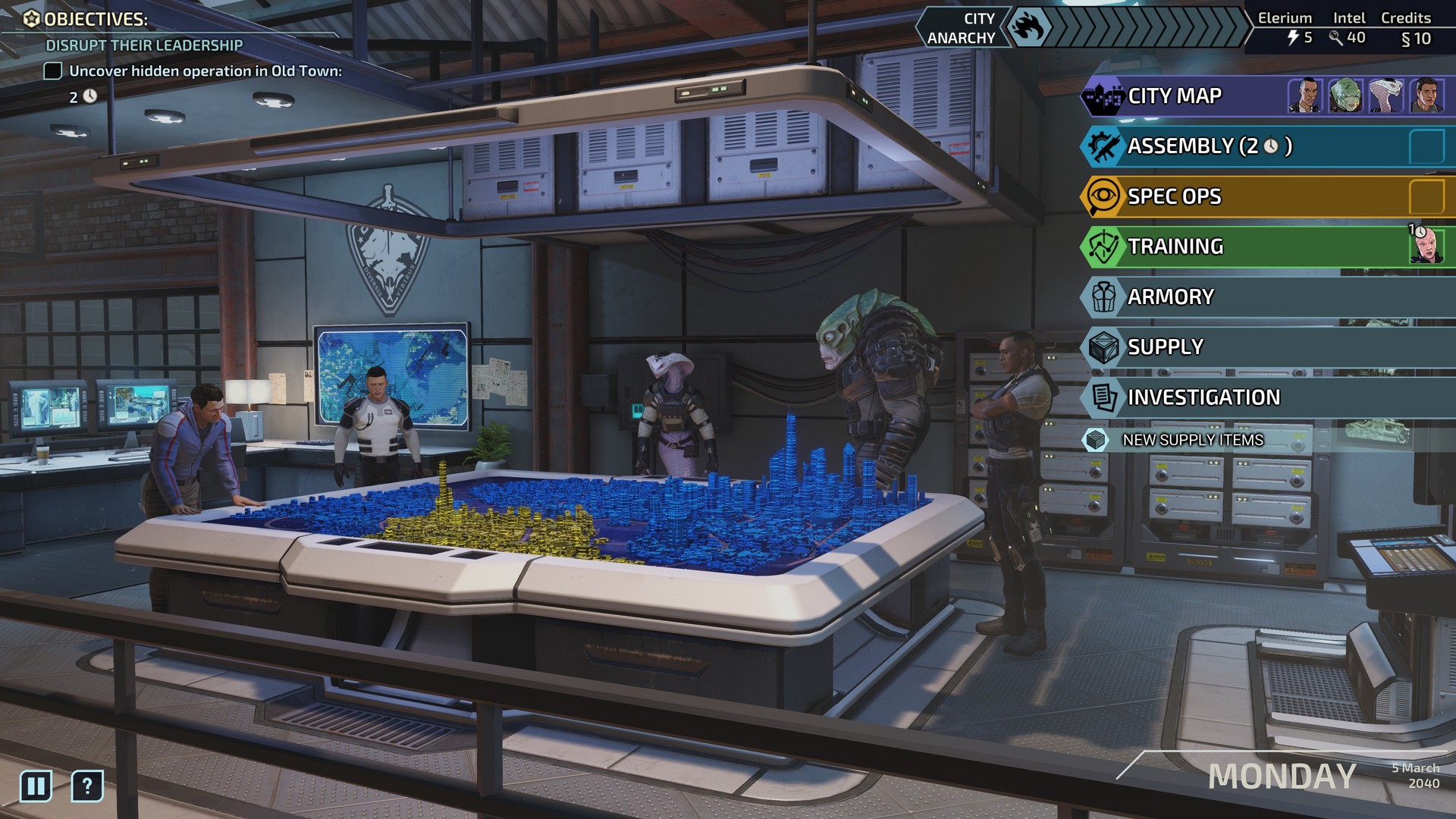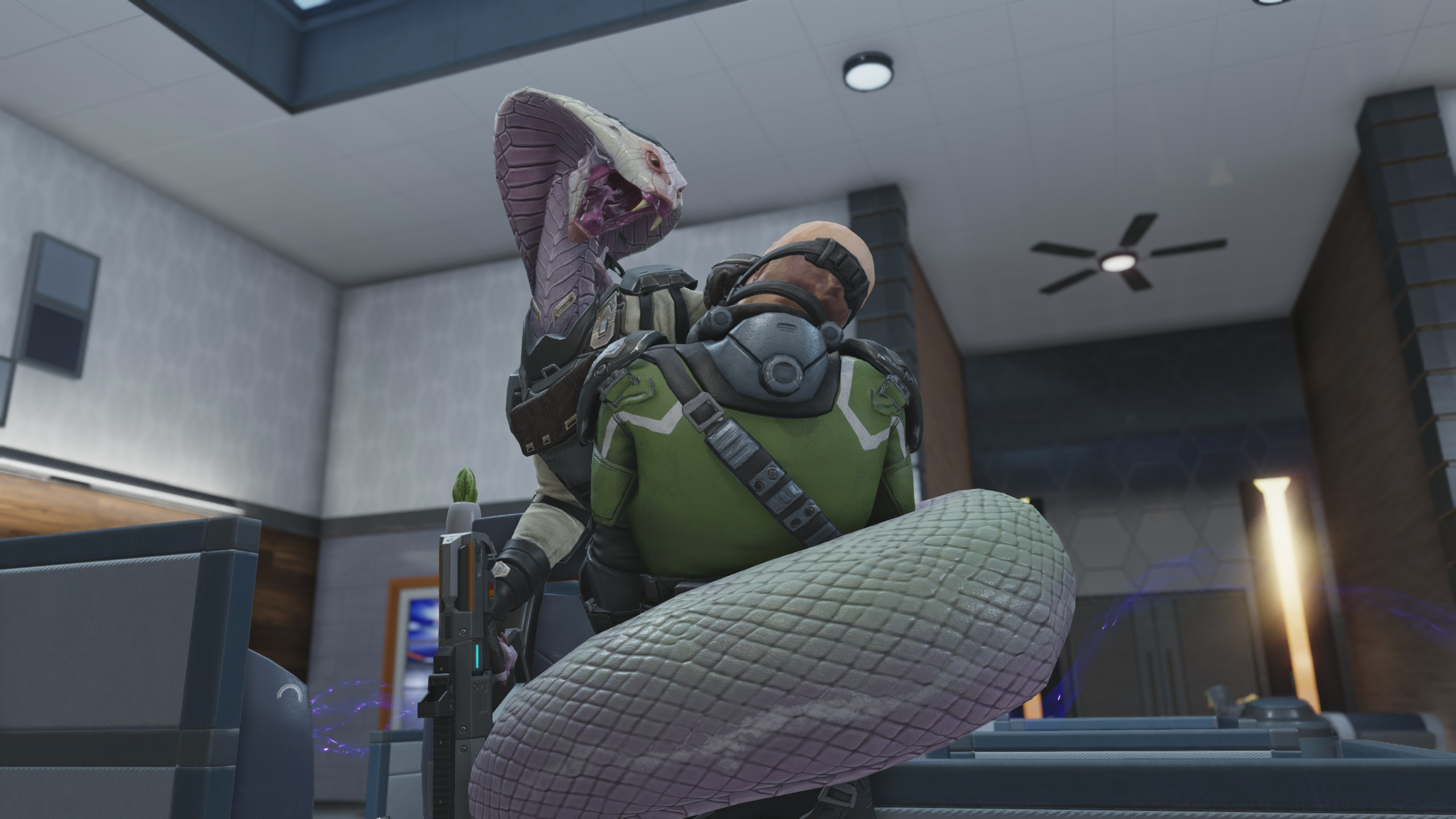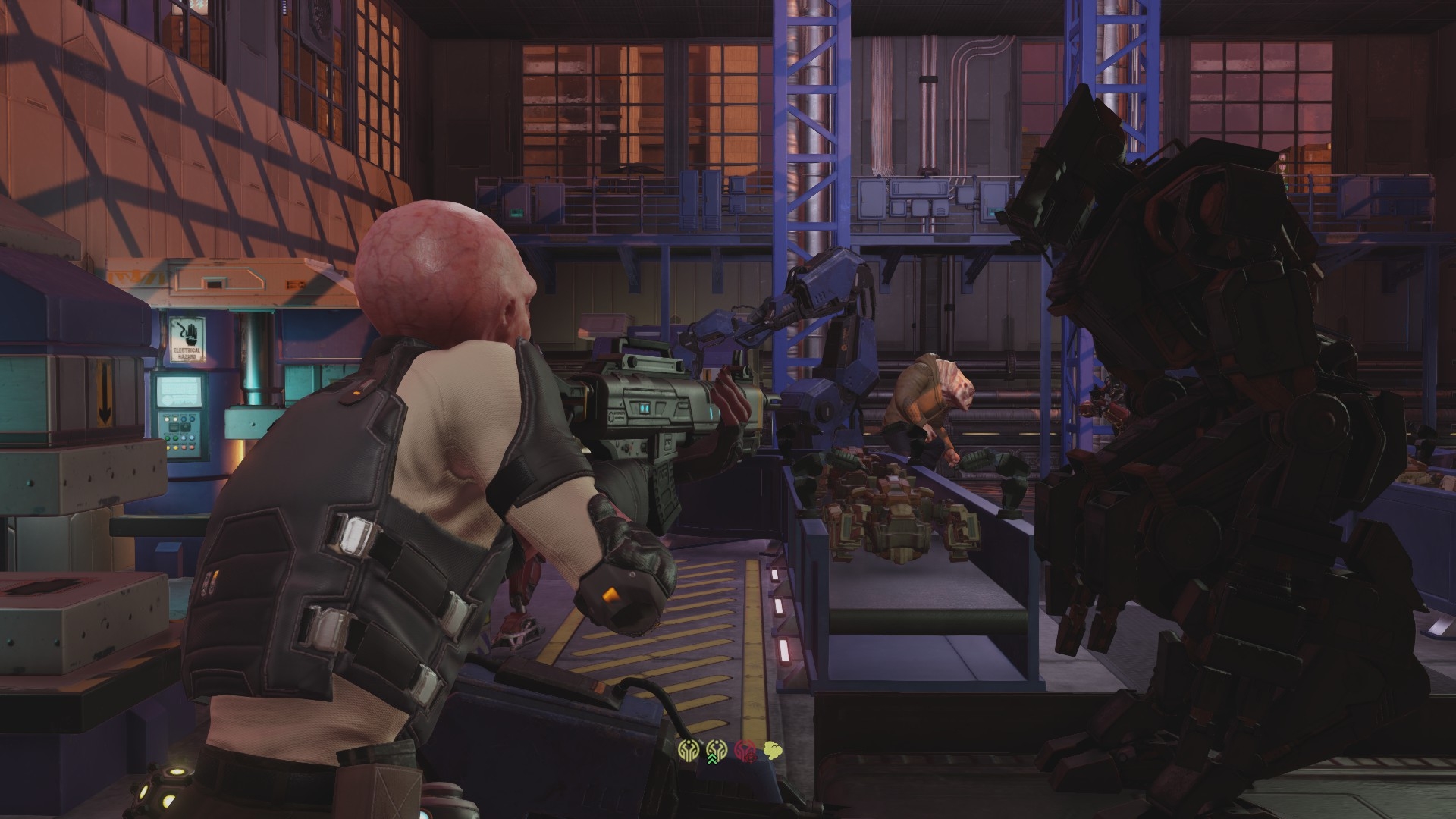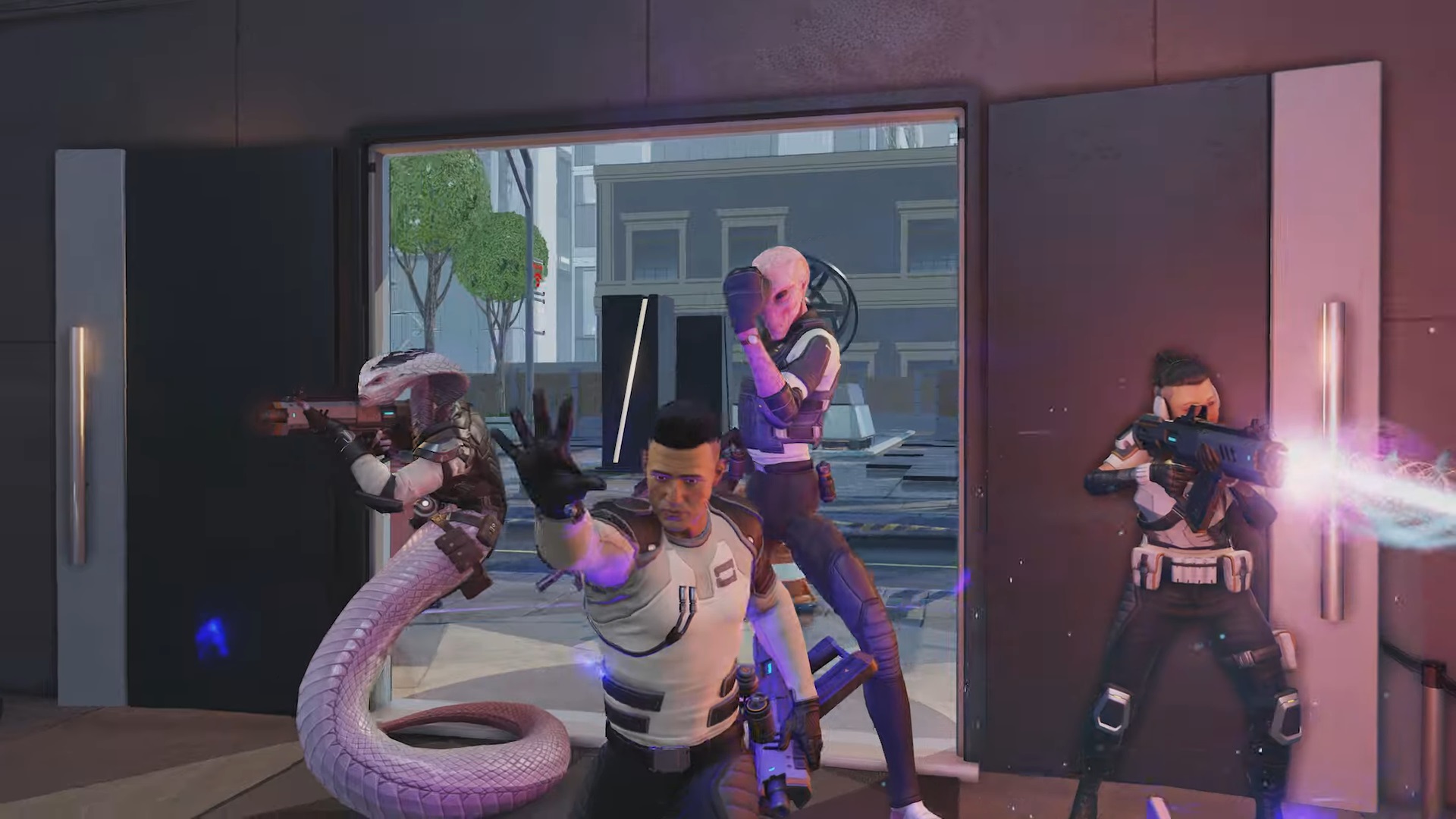
After Alien Hunters and Chosen Assassins, the Long War 2, and much, much more, expectations were high for the next XCOM. XCOM: Chimera Squad from Firaxis isn’t that – it’s a sequel, sure, but spins off its own tale of tactical RPG goodness. The result is something with a smaller scale but still compelling in its own way
Following the destruction of ADVENT in XCOM 2, City 31 is established. This bustling metropolis sees humans, aliens and hybrids living together in mostly harmonious ways. Of course, it isn’t long before someone tries to disrupt the peace, killing Mayor Nightingale. As part of Chimera Squad, a ragtag squad of agents with multiple species, it’s your job to find out who’s responsible. All the while, peace must be maintained in City 31 or Unrest will build and result in a collapse (read: Game over).
"While I can’t attest to everyone enjoying every back and forth quip or plot point, they suit this constrained powder keg of an urban setting all the more."
Instead of single-mindedly working on dismantling the aliens and the Overlords, there’s a stronger emphasis on cooperation and understanding between squad mates. It’s all the more obvious when the various personalities banter, work together and even clash on some occasions. Terminal is a wise-cracking human and generally helpful medic. Verge is your mild-mannered, polite Sectoid capable of bending enemies’ minds to his will but there are hints of past atrocities in a sealed file. Torque is a snarky Viper who has some kind of past with ops-driver Whisper. And so on and so forth.
It’s a stark contrast to XCOM 2‘s blank slate character, which could be molded into anything you desired as their exploits defined their identities. Chimera Squad offers a more personal touch, which is helped by mostly good writing and interesting backstories. While I can’t attest to everyone enjoying every back and forth quip or plot point, they suit this constrained powder keg of an urban setting all the more.
Unrest permeates the atmosphere in more ways than one. After the initial set-up, you’re tasked with investigating one of the three main factions that could be responsible for Nightingale’s assassination. Each has their own modus operandi, whether it’s the Grey Phoenix with their advanced weaponry, the Sacred Coil with their robots or The Progeny and their psionic powers.
Once the Groundwork is done, you’ll undertake different Operations which won’t be available until a few days have passed. Completing side missions, where you control your squad, and Situations, which are more like menu-based events that dole out rewards (but cause the day to pass) help to quell Unrest while passing time till the next Operation. Spend enough Intel and you can deploy Field Teams in different districts for earning additional resources. It’s even possible to reduce Unrest or overall City Anarchy thanks to Field Team abilities.
"Some of the visual design is revamped especially with a sleek comic book-style aesthetic used for character portraits, cutscenes and conversations."
The Assembly is still used to research new upgrades while new items are purchased in the Supply menu. Training is a bit more streamlined, either increasing an Agent’s stats or unlocking new abilities like Guardian for Terminal or Return Fire for Cherub. They can also be used to get rid of Scars – permanent debuffs to one’s character if they fall in battle.
You can also send Agents out on Spec Ops missions to obtain Intel, Elerium or Credits. As time goes by and the roster grows, multiple Agents can be assigned to speed up research or take on Spec Ops missions. The trade-off is they’ll be unavailable for deployment where their talents might be useful, especially when Dark Events come into play, making Investigations that much more challenging. Subsequent upgrades increase the complexity of resource management as well, especially when you consider the the Scavenger market that appears intermittently with its own inventory.
Much of this will be familiar for XCOM 2 veterans, right down to similar looking enemies like Berserkers and Sectoids. Some of the visual design is revamped especially with a sleek comic book-style aesthetic used for character portraits, cutscenes and conversations.
Then there’s the combat, which offers significantly more changes. First off, you’ll start each mission in Breach Mode, choosing different points of entry for a combat situation. Different entry points can have both positive (like extra damage dealt) and/or negative effects (a unit being marked or rooted after the breach is finished). You also have to weigh the pros and cons of damage to an Agent, especially when deciding where to send someone like Cherub who can effectively tank hits from aggressive foes.
"Combined with Breach mode, encounters can devolve into intriguing mind-games."
Once you clear an area, it’s on to the next and the breaching process starts anew. Agents can unlock abilities to use before a breach and – depending on the items they have equipped or their own special talents – also use different entry points. As a Viper, Torque can slither into vents to surprise the enemy. Axiom, the Muton, can burst through walls a la Koolaid Man. Though Breach encounters start off fairly one-note, their complexity builds at a steady but none-too-overwhelming pace.
Normally in an XCOM game, your units would all take their turns and then the enemy side would take their turns (with some exceptions here and there). XCOM: Chimera Squad offers a more RPG-esque turn-order system. After a Breach, a timeline will be displayed, showcasing the order that different units will take turns. Different abilities like Verge’s Stupor can be used to stun enemies, causing them to bypass their turns completely. Further throwing a wrench into all of this is Preparation, which is akin to Hunker Down but can also move someone’s turn up in the timeline, and Team-Up, a once-per-mission perk that immediately moves up an Agent’s turn in the timeline. The latter can be invaluable when taking down a potentially dangerous foe, given the circumstances.
Combined with Breach mode, encounters can devolve into intriguing mind-games. Do you take out the more dangerous enemies first or weaken them to make subsequent fights easier (if not to apprehend them instead of killing)? Do you spend a Breach ability early on or save it for latter encounters? Who should be deployed where for the best advantage? Such decisions help mitigate some of the mechanical repetitiveness of breaching. I would have also liked being able to manually reposition allies after each Breach but alas.
"It’s all fairly simple but the synergies and different ways to use these abilities, especially depending on each situation, can be pretty deep."
Fair warning: Much of the standard RNG nonsense will still apply for hit percentages so be prepared for shots with a 94 percent hit chance to whiff. At the very least, the penalties for failure are much less severe since units can’t permanently die. Instead, they’ll enter a downed state and can be stabilized. Not doing so will cause the mission to fail. If a unit goes down before the last Breach section, then robots can be deployed as temporary squad members (and can most certainly be destroyed, costing resources to replace).
Though the customization isn’t on the level of War of the Chosen, Chimera Squad still does a good job with giving you different options. Cherub gains Charges when his Kinetic Shield is destroyed, which increases the damage of his Shield Bash. One upgrade will cause enemies to focus fire on him and build Charges more quickly, which can make for more devastating shield-bashes.
Torque can either opt for more mobility and a permanent increase to Dodge or have her Bind do more damage, making quick work of bigger target. When using Psionic abilities on enemies, Verge will add them to the Neural Network and can either increase his aim and crit chance per foe added or knock out all connected enemies instead of killing them. Again, it’s all fairly simple but the synergies and different ways to use these abilities, especially depending on each situation, can be pretty deep.
"The premise of “XCOM meets Cops” could have used a bit more objective variety though."
Given everything that XCOM: Chimera Squad has to offer, is it fair to compare it to XCOM 2: War of the Chosen, even without all the mods attached? Well, no. While certainly a more constrained in a number of ways, Chimera Squad is also a more focused experience, both in terms of its narrative and combat loop. The tension of permanently losing allies is gone, for sure but the game does a good job of keeping you on edge with impactful tactical decisions. Admittedly, missed shots feel annoying and less like the deciding factor for a character’s life.
The premise of “XCOM meets Cops” could have used a bit more objective variety though. When a district descends into Anarchy, it would be the perfect time to work with 31PD to arrest rioting civilians along with any enemy faction that may be contributing to the Unrest. Alas, these Anarchy missions are little more than “Stop enemies from escaping” through a set number of sections as you breach and clear.
The multiple stages of the investigations are nice, as you unearth a faction leader’s identity and subsequently take them down, but there’s nothing in terms of mission variety that a grizzled XCOM veteran – forget RPG and strategy fans – hasn’t seen before. At the very least, in addition to Ironman Mode, there are difficulty options like Hardcore where a single mission failure results in campaign loss and the option to add five levels to City Anarchy to start with. You can also adjust how much your squad heals after every Breach encounter – set it to “none” to add a bit more consequence to skirmishes.
"XCOM: Chimera Squad isn’t the next big step for the franchise but it is a fun detour into an alternate scenario, one with its own hooks and idiosyncrasies."
Also, it wouldn’t be an XCOM game without some bugs, like enemy corpses or Agents glitching out. At one point, reloading from a previous save point caused enemy reinforcements not to spawn (despite the loud “Reinforcements Imminent” notification in the timeline). The game also hanged and crashed at least once. While the number of bugs and issues wasn’t overwhelming, they’re definitely there along with your standard delays in enemy reactions and weird animations, like the camera focusing on a target as your Agent fires in the complete opposite direction (and still hits the target)
There’s a lot to like about XCOM: Chimera Squad though. It’s not going to reinvent the tactical turn-based strategy wheel or stand out as the best the genre has to offer. But it will offer a relatively quick experience with nuanced tactics, interesting characters, fun mechanics and tense moments against the backdrop of a city on the edge. Mod support is also included which should lead to more expanded scenarios and customization down the line. As it stands, XCOM: Chimera Squad isn’t the next big step for the franchise but it is a fun detour into an alternate scenario, one with its own hooks and idiosyncrasies.
This game was reviewed on PC.
Interesting narrative and themes that expand on the XCOM mythos. Likable characters with varied abilities and decent customization. Breach Mode and turn order put an interesting spin on the traditional cover-based tactics. Managing district Unrest and investigating different suspects adds an extra layer of depth.
Despite being something else entirely, it's still fairly simplified compared to XCOM 2: War of the Chosen. Removal of Permadeath and custom soldiers may irk some players. Glitches and bugs from the previous game still persist. Mission objectives feel pretty familiar after a while.




















